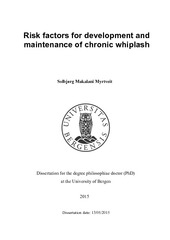| dc.contributor.author | Myrtveit, Solbjørg Makalani | en_US |
| dc.date.accessioned | 2015-09-02T07:59:35Z | |
| dc.date.available | 2015-09-02T07:59:35Z | |
| dc.date.issued | 2015-05-13 | |
| dc.identifier.isbn | 978-82-308-2643-0 | en_US |
| dc.identifier.uri | https://hdl.handle.net/1956/10375 | |
| dc.description.abstract | Background: After experiencing whiplash accidents, most individuals recover rapidly. Others, however, develop chronic whiplash, a condition characterized by long lasting neck pain, somatic complaints and symptoms of anxiety and depression. Individuals with chronic whiplash report the condition to reduce their quality of life and ability to work. As most individuals recover from whiplash accidents without needing medical attention, identifying those at risk of chronic complaints, and in need of treatment, is important. Factors related to the whiplash accident, like speed and extent of damage to the cars, as well as findings from clinical imaging seem poorly correlated with outcome. Previous research indicates that socio-demographic factors, pre-injury somatic and mental health as well as coping might be associated with prognosis. However, as existing literature remains inconclusive, and much of the research is based on retrospectively collected data, more evidence is needed. Aim: The overall aim of the thesis was to investigate whether socio-demographic factors, pre- and post-injury health, use of health care and medications, and early coping preferences are associated with outcome after whiplash accidents. Method: In study one and two data from two waves of the large, Norwegian population-based Nord-Trøndelag Health Study (HUNT2 and HUNT3) was used. Study one investigated whether socio-demographic variables (such as age, gender, education) and health related variables (such as perceived health, health behavior and use of health-services, musculoskeletal complaints, somatic complaints, medical diagnoses and anxiety and depression) measured before the accident were associated with development of chronic whiplash. Study two investigated whether socio-demographic and health-related variables measured in individuals with whiplash were associated with recovery. Study three used prospective data from Denmark, following individuals with acute whiplash for a year. Coping and health care preferences reported during the first few days following the whiplash accident were described. The associations between early health care/coping preferences and outcome (neck pain/reduced capability to work) one year later were investigated. Results: The three studies in this thesis show that: Poor pre-injury health, both mental and somatic, is associated with development of chronic whiplash (study one). Similar health complaints reported among individuals with whiplash are associated with nonrecovery from the condition (study two). A high use of health care services and medications before the injury is associated with increased risk of developing chronic whiplash (study one). High use of health care and medications among individuals with whiplash is associated with non-recovery (study two). Patients’ coping preferences in the acute phase after whiplash injuries are associated with outcome in whiplash (study three): Reporting passive coping preferences and need of health care increase the risk of neck pain and reduced capability to work one year later. Individuals who prefer active coping and want to keep living as normal have a better prognosis. Conclusion: Chronic whiplash is a complex condition characterized by a broad range of complaints. Clinical imaging and accident related factors seem to be poor predictors of outcome. Poor pre-injury health and use of health services and medications are associated with subsequent chronic whiplash. Similar variables in individuals with whiplash are associated with non-recovery. Preferring use of health care and passive coping after whiplash is associated with non-recovery. As such chronic whiplash resembles functional somatic syndromes. Knowledge of prognostic factors might aid identification of individuals at risk of an adverse prognosis after whiplash, enabling earlier treatment for those most in need. However, health care in whiplash is often ineffective and might itself increase the risk of poor recovery. More research on treatment of whiplash is needed; in particular on whether targeting prognostic factors like those identified in this thesis can improve recovery. | en_US |
| dc.language.iso | eng | eng |
| dc.publisher | The University of Bergen | eng |
| dc.relation.haspart | Paper I: Myrtveit, S. M., Wilhelmsen, I., Petrie, K. J., Skogen, J. C., & Sivertsen, B. (2013): What characterizes individuals developing chronic whiplash?: the Nord- Trøndelag Health Study (HUNT), Journal of Psychosomatic Research, 74(5), 393-400. The article is not available in BORA due to publisher restrictions. The published version is available at: <a href="http://dx.doi.org/10.1016/j.jpsychores.2013.02.004" target="blank"> http://dx.doi.org/10.1016/j.jpsychores.2013.02.004</a> | en_US |
| dc.relation.haspart | Paper II: Myrtveit, S. M., Skogen, J. C., Petrie, K. J., Wilhelmsen, I., Wenzel, H. G., & Sivertsen, B. (2013): Factors Related to Non-recovery from Whiplash. The Nord-Trøndelag Health Study (HUNT), International Journal of Behavioral Medicine, 21(3), 430-438. The article is not available in BORA due to publisher restrictions. The published version is available at: <a href="http://dx.doi.org/10.1007/s12529-013-9338-6" target="blank">http://dx.doi.org/10.1007/s12529-013-9338-6</a> | en_US |
| dc.relation.haspart | Paper III: Myrtveit, S. M., Carstensen, T., Kasch, H., Ørnbøl E., & Frostholm, L. (2015): Initial health care and coping preferences are associated with outcome 1 year after whiplash trauma: a multicentre 1-year follow-up study, BMJ Open, 5(3), e007239. The article is available at: <a href="http://hdl.handle.net/1956/10374" target="blank">http://hdl.handle.net/1956/10374</a> | en_US |
| dc.title | Risk factors for development and maintenance of chronic whiplash | en_US |
| dc.type | Doctoral thesis | |
| dc.rights.holder | Copyright the author. All rights reserved | |
| dc.identifier.cristin | 1253795 | |
